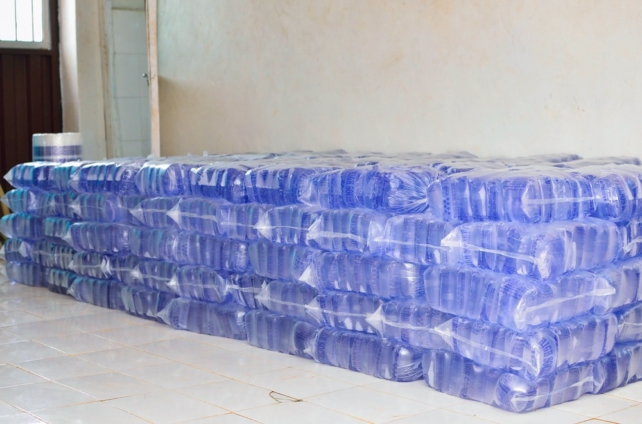Ghana’s Food and Drugs Authority (FDA) has debunked claims that sachet water on the market is contaminated with faecal matter.
The Authority said the outcome of its regular surveillance of sachet water producers is not in conformity with observations by the Ghana Statistical Service.
A study by the Ghana Statistical Service revealed that most sachet water on the market was contaminated with faecal matter.
The multiple indicator cluster survey conducted in 2017 revealed 34.1% of households in Ghana which relied on sachet water as a drinking water source had an appreciable amount of Esherichia coli, a contamination indicator.
In a response to media reports on the poor quality and safety of sachet water, the FDA assured of regular inspection of manufacturing facilities premised on the Authority’s guidelines.
The Authority said it inspects packaging materials to ensure they meet their respective standards.
They inspection includes E. coli, total coliforms, aerobic plate count, Pseudomonas aeruginosa, Streptococcus faecalis and Clostridium perfringens.
The FDA stressed that its laboratory facilities conduct periodic water safety tests and product quality analyses on packaged water on the market.
The statement signed by the Chief Executive Officer of the FDA said “the Authority wants to remind the public of its responsibility to protect consumers, as mandated by the Public Health Act, 2012 (ACT 851). With regard to packaged water (bottled and sachet), the FDA ensures this through the licensing of the manufacturing premises and the registration of these products. The inspection covers the starting material (water) to packaging materials to ensure they meet their respective Ghana standards: and the finished products to meet the requirements of GS175-1:2002 (for drinking water) and GS220:2014 (for mineral water). All inspections are done in accordance with the current Codes of Good Manufacturing Practices (GMP) where end products are released in accordance with the above-stated specifications”.
"The FDA also ensures producers comply with the production process which includes Filtration/Reverse Osmosis which rids water sources of extraneous material, and UV sterilization for destroying deadly disease-causing microorganisms," the regulatory body said.
The Authority is however urging the public to patronize only registered sachet and bottled water manufactured in Ghana.
The public is also admonished to report any unregistered sachet and bottled water at any of its nearest offices across the country.
“The public is strongly advised to patronize only registered sachets and bottled water manufactured in Ghana that bear the FDA product registration numbers,” the statement read.
Latest Stories
-
Gold Fields Ghana Foundation challenges graduates to maximise benefits of community apprenticeship programme
1 hour -
GBC accuses Deputy Information Minister Sylvester Tetteh of demolishing its bungalow illegally
2 hours -
Boost for education as government commissions 80 projects
2 hours -
NAPO commissions library to honour Atta-Mills’ memory
2 hours -
OmniBSIC Bank champions health and wellness with thriving community walk
2 hours -
Kora Wearables unveils Neo: The Ultimate Smartwatch for Ghana’s tech-savvy and health-conscious users
2 hours -
NDC supports Dampare’s ‘no guns at polling stations’ directive
2 hours -
Police officer interdicted after video of assault goes viral
2 hours -
KNUST’s Prof. Reginald Annan named first African recipient of World Cancer Research Fund
2 hours -
George Twum-Barimah-Adu pledges inclusive cabinet with Minority and Majority leaders
3 hours -
Labourer jailed 5 years for inflicting cutlass wounds on businessman
3 hours -
Parliament urged to fast-track passage of Road Traffic Amendment Bill
3 hours -
Mr Daniel Kofi Asante aka Electrician
3 hours -
Minerals Commission, Solidaridad unveils forum to tackle child labour in mining sector
3 hours -
Election 2024: Engagement with security services productive – NDC
3 hours

